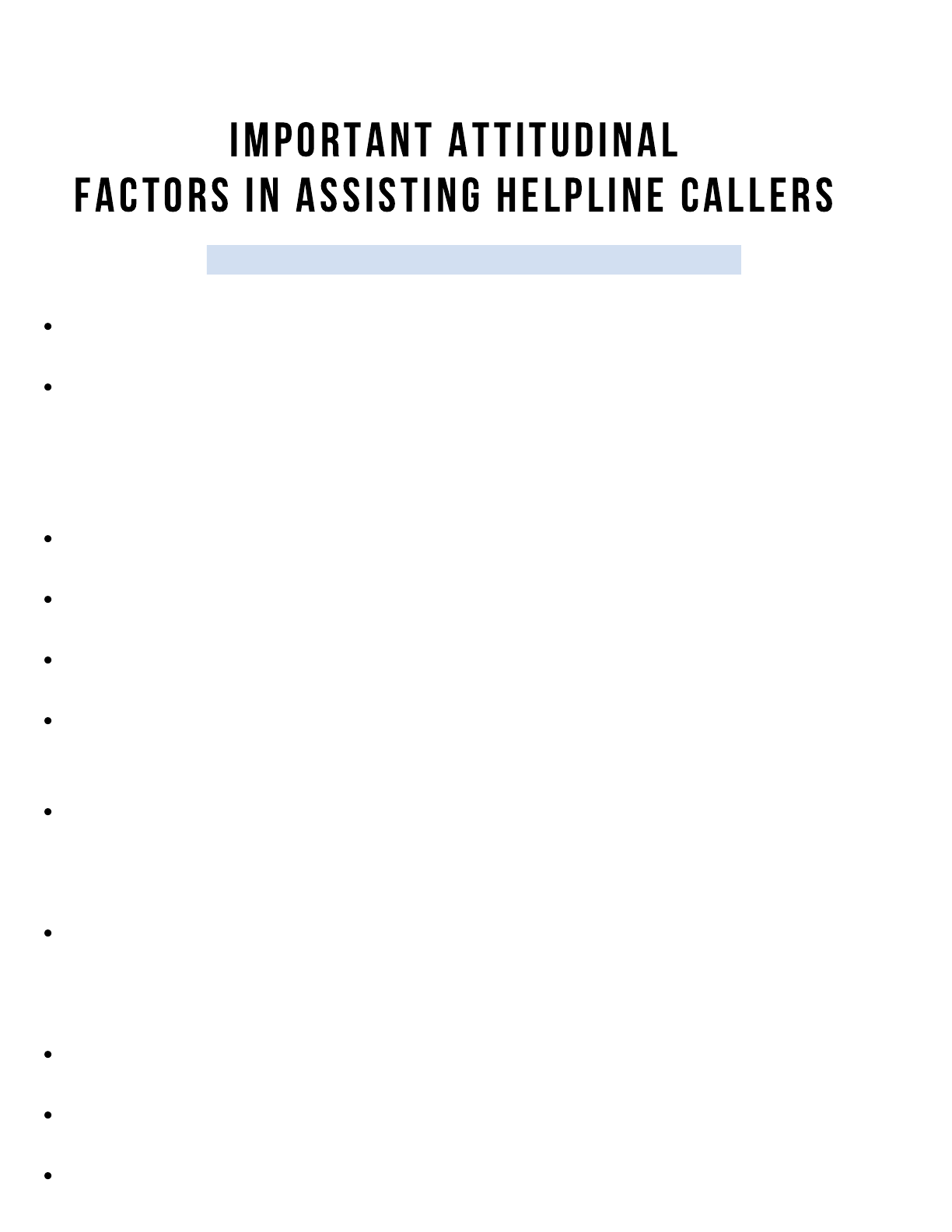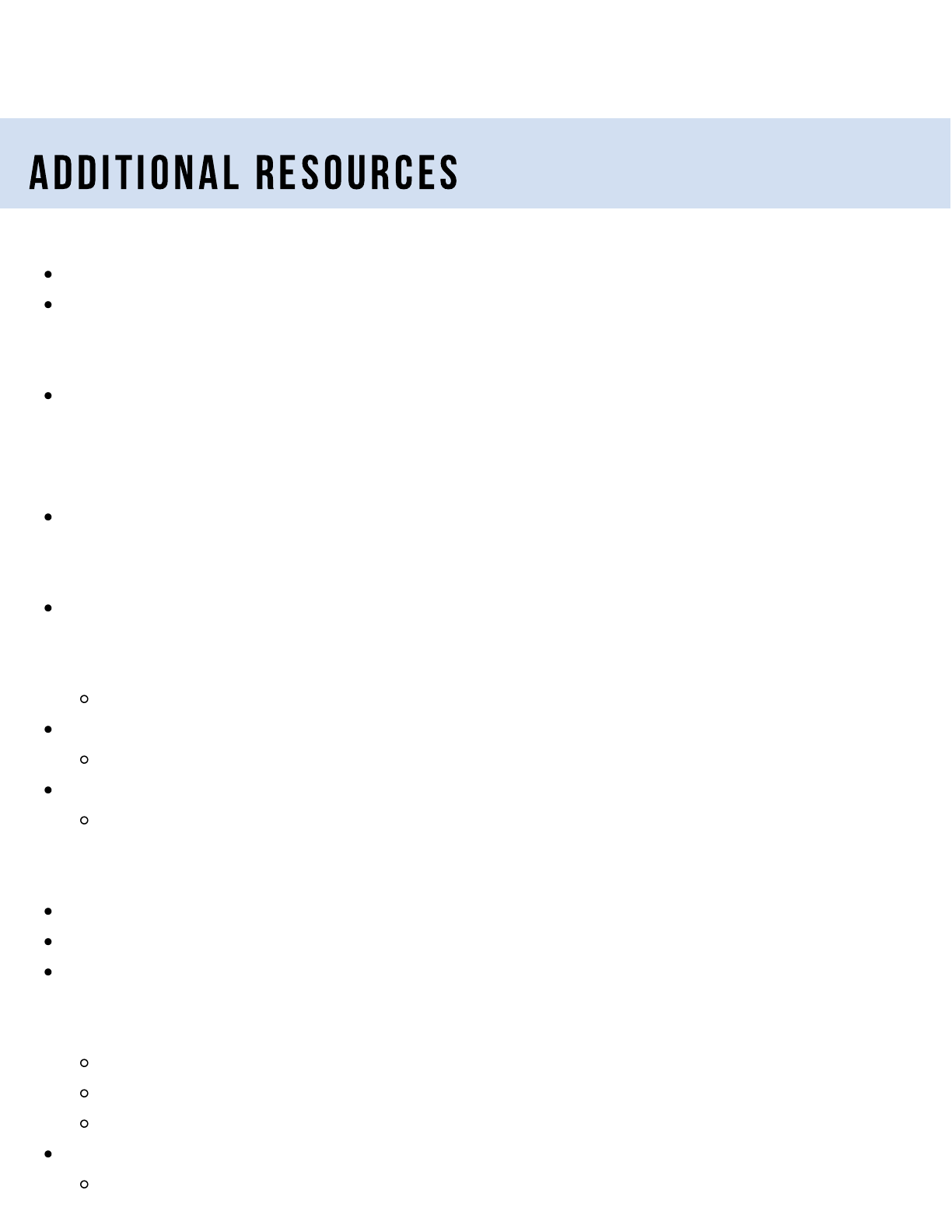
Prepared by: National Alliance on Mental Illness of Ohio
Updated November 2020

NAMI OHIO HELPLINE GUIDE //
The NAMI Ohio Helpline receives a variety of calls. Not all are specific to
a mental health issue and sometimes Helpline callers are not clear about
why they are calling.
You may have some who were given NAMI’s number but do not know
exactly how our organization can help.
Sometimes they do not know where to start so your first task is to
provide them some space to express their need/situation and ask some
questions that can help clarify how you might be able to offer assistance.
IMPORTANT - 24/7 SUPPORT AVAILABLE
The Ohio Department of Mental Health and Addiction Services
established the Ohio CareLine, a toll-free emotional support call service.
Behavioral health professionals staff the CareLine 24 hours a day, 7 days/week.
They offer confidential support in times of personal or family crisis when
individuals may be struggling to cope with challenges in their lives.
Callers will receive assistance and connection to local providers.
Call 1-800-720-9616 to connect
The line is for those with emotional distress concerns.

First, establish rapport. Tell the caller your first name and ask how you can help.
Be an active listener. This means you are really listening to and understanding what the
caller is saying. You ask open-ended questions. You take notes as you talk as a way to
gather information. You repress empathy and recognize the emotions they are
experiencing. You do not over promise.
Questioning: ask open-ended questions to clarify what has already been said
Try not to interrupt until they have shared the basis for their call.
Define the problem – if it is specific.
Acceptance of individuals who call that are different from yourself. Have a non-judgmental
response.
Be balanced and realistic about what you can and cannot do. You cannot alone ‘save’
someone or solve all their problems. You can point them in the right direction. You can
listen and be kind and supportive.
Be honest with yourself about the types of calls and issues that you may be uncomfortable
addressing and think about how you can remain neutral and helpful when dealing with a
call that is specific to that topic.
Assess the situation and ask for clarification from the caller if necessary.
Explore options.
Gather contact information for follow up or simply for documentation.
NAMI OHIO HELPLINE GUIDE //

NAMI OHIO HELPLINE GUIDE //
Remain calm
Explain that your loved one is having a mental health crisis and is not a criminal
Ask for a Crisis Intervention Team (CIT) officer, if available
Your name
The person’s name, age, description
The person’s current location
Whether the person has access to a weapon
Mental health history
diagnosis(es)
Medications, current/discontinued
Suicide attempts, current threats
Prior violence, current threats
Drug use
Contributing factors (i.e. current stressors)
What has helped in the past
Any delusions, hallucinations, loss of touch with reality
Threats of homicide
Weapons available
ADVISE CALLERS TO DO THE FOLLOWING WHEN REACHING OUT FOR HELP:
1.
2.
3.
Emergency responders will ask:
Information that may need to be communicated:
Crisis Intervention Team (CIT) programs across the country help direct persons with mental illness
into treatment instead of inappropriate incarceration. These officers are trained in techniques for
de-escalating crises. Officers learn to integrate their police training with some different
approaches to a person they believe to have a mental disorder.

NAMI OHIO HELPLINE GUIDE //
Ohio Adult Care Facility Association:
www.ohioadultcarefacilitiesassociation.org
OACFA Housing Locator:
www.oacfalocator.org
SUD Recovery Housing:
https://find.ohiorecoveryhousing.org/
General Housing:
www.ohiohousinglocator.org/
Residential State Supplement:
https://mha.ohio.gov/Families-Children-and-Adults/For-Adults/Housing-
Assistance/Residential-State-Supplement
How to identify housing for people, this includes: group homes, ACF’s, apartments.
Housing resources include:
NAMI Support Groups
https://namiohio.org/programs/
Find local NAMI Affiliate
https://namiohio.org/local-chapters
Mental Health America Ohio
https://mhaohio.org/get-help/support-groups/
SAMHSA National Helpline
https://samhsa.gov/find-help/national-helpline
Narcotics Anonymous
www.na.org
Alcoholics Anonymous
www.aa.org/pages/en_us/find-local-aa
(those living with mental illness, family members & caregivers)

Because access to mental health treatment is often driven by the
health insurance provider or payer source, it is helpful to ask the
caller if they have insurance coverage.
This includes Medicaid as well as employer or retirement
insurance programs.
If they have coverage, suggest that they look for a phone number
on their card that says: behavioral health or mental health. This
will help them learn what providers are in their plan. This might
lead them to individual therapists, psychiatrists, psychologists or
provider agencies.
For those with no health insurance, identifying their local ADAMH
or CMHR Board is the next step to see if there is a sliding fee
scale available or assistance for indigent individuals.
NAMI OHIO HELPLINE GUIDE //
Ohio Medicaid Managed
Care Plans (MCOs)
For individuals covered with
Medicaid, each managed care
plan has a number for phone
contact as well as a website that
has provider information. At the
present time, there are five plan
that individuals can obtain
coverage through. Those plans
are listed here.
Buckeye Health Plan
1-866-246-4358
www.buckeyehealthplan.com
CareSource
1-800-488-0134
www.caresource.com
Care Advocacy Team
1-800-488-0134
Molina Healthcare
1-800-642-4168
www.molinahealthcare.com
Paramount Advantage
1-800-462-3589
www.paramounthealthcare.com
United Healthcare Community
Plan
1-800-895-2017
www.uhccommunityplan.com
www.oacbha.org/mappage.php
www.theohiocouncil.org/
Ohio Council Member list:
https://obc.memberclicks.net/assets/OC%20Member%20
List%208-19-2020.pdf
Ohio Association of County Behavioral Health Authorities
The Ohio Council of Behavioral Health & Family Services
Providers

In general, access to treatment for youth is similar to the information provided
above for adults. That means, their insurance or payer source drives some of
that access. In addition, many communities also have specific funds for support and other
programming for children and youth. Often, this is through the local Family and Children
First Council.
It is important to note that many times, families will ask about residential placement
options for children and/or youth. While Medicaid and private insurance may cover part of
this cost, admission is based on a variety of factors.
Most residential facilities require a referral from a county children’s services board, juvenile
court or mental health provider. Once received, the facility will review the referral
and conduct a phone screening. Most, even during COVID, will require a face to face with
the youth as well.
Even if Medicaid covers the cost for the mental health services received, there is a per-diem
cost that can run from $125 a day to $350 a day depending upon the facility and the level
of care. Insurance will not cover that cost, it is up to the system of care or the parents.
NAMI OHIO HELPLINE GUIDE //
Ohio Family and Children First provides county by county resources and supports.
https://mha.ohio.gov/Families-Children-and-Adults/For-Children
The Ohio Children’s Hospital Association has links to Children’s Hospitals around
https://www.ohiochildrenshospitals.org/
the state. Many of these hospitals have psychiatric units for children and/or youth.

NAMI OHIOHELPLINE GUIDE //
Clinical documentation- Diagnostic Assessments; Psychological Reports, Individual
Care Contract Agreement
Information on incidents of aggression.
IQ and information on functioning level
What type of information do you request from referral sources prior to admission to
determine if the child/youth moves on to the next phase of screening?
Many facilities require a face to face meeting with every youth accepted.
During COVID, may hold a meeting over Zoom or other platform
Requirements for face-to-face meetings with the child/youth?
Diagnosis, age, history of aggression/violence, etc.
History of fire setting (specifically have they set fires with intent to harm others)
Level of self-injurious behavior.
Goodness of fit between the youth being referred and the present youth in
the program is of the utmost importance.
What other factors do you consider when contemplating a youth for admission?

National Suicide Prevention Lifeline: (800) 273- 8255
National Crisis Text Line: Text "4hope" to 741 741
https://namiohio.org/wp-content/uploads/2020/11/Community-Help-and-Crisis-Lines-
Updated.pdf
https://namiohio.org/local-chapters/
www.oacbha.org/mappage.php
https://mha.ohio.gov
Ohio MHAS Client Rights & Bridge Line
https://mha.ohio.gov/Families-Children-and-Adults/Get-Help/Client-Rights
24/7 Ohio Careline
1-800-720-9616
https://mhaohio.org/
http://mhalc.org/
https://www.mhankyswoh.org/
614-466-7264
1-800-828-9181 - option 2 to leave a message
www.disabilityrightsohio.org/
Employment Discrimination
www.disabilityrightsohio.org/employment-mental-disabilities-ada
National Crisis Lines
Ohio County Crisis Lines
NAMI Ohio Affiliates
Local ADAMH Boards
Ohio Department of Mental Health & Addiction Services (MHAS)
Mental Health America Ohio Affiliates
Disability Rights Ohio
NAMI OHIO HELPLINE GUIDE //

Ohio Attorney General Task Force
www.ohioattorneygeneral.gov/Individuals-and-Families/Victims/Task-Force-on-Criminal-
Justice-and-Mental-Illness
NEOMED Ohio Criminal Justice Coordinating Center for Excellence:
https://www.neomed.edu/cjccoe/about/
Ohio MHAS Community Linkage program that works with adult offenders and juvenile
offenders.
https://mha.ohio.gov/Schools-and-Communities/Criminal-Justice/Re-entry-
Programs/Community-Linkage
Contact: Jennifer Roach: 614-466-1325
Vets4Warriors
https://www.vets4warriors.com/
(855) 838-8255
Ohio Domestic Violence Network
https://www.odvn.org/
(800) 934-9840
LGBT National Hotline: (888) 843-4564
LGBT Youth Talkline: (800) 246-7743
LGBT National Senior Hotline: (888) 234-7243
Criminal Justice Issues
Veterans
Domestic & Sexual Violence
LGBTQIA+
NAMI OHIO HELPLINE GUIDE //
https://namiohio.org/wp-content/uploads/2020/12/Helpline-Resources-by-Affiliate-Area.xlsx
